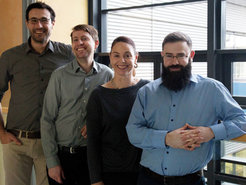Artist-in-Residence program at the Max Planck Institutes of Molecular Plant Physiology and Colloids and Interfaces in Potsdam starts 2017
The project “Knowlegde Link through Art and Science“ (KLAS) brings innovative artists to the Potsdam-Golm Science Park. In the course of the 8-month program the artists will work for four weeks side by side with researchers. From March 2017 the host institutions in Golm and the University of Groningen will welcome the various personalities associated to this program. In addition it will bring talks and visits of interdisciplinary practicioners. More details regarding the application procedure and other particulars may be found here. The deadline for applications is 31 January 2017.

KLAS-Team, from left to right: Rodrigo Perez-Garcia (MPIKG/TU-Berlin), Dr. Tom Robinson (MPIKG), Katja Schulze (MPIKG), Dr. Arren Bar-Even (MPIMP)
KLAS is the first Artist-in-Residence program in a Max Planck Institute of the natural sciences, made possible by the Max Planck Society and the Ernst Schering Foundation and supportedby UNESCO International Relations’ Chair, the program „Klangkunst“ of DeutschlandRadio Kultur and Ars Electronica. The topic selected is Synthetic Biology and hence the name, AESTHETIC get SYNTHETIC: Knowledge Link through Art and Science (KLAS). This innovative program will bring high-profile artists into selected research groups. In doing so, it will build a strong link between science and society and will provide additional insight into the timely and highly debated research field of Synthetic Biology. Scientific experiments in the laboratory as well as data evaluation will meet artistic research tools and curiosity. Such art and science encounters are particularly powerful when they are able to bridge the gap between the fields, and may provide a fresh look into our daily tasks and working methodologies.
Synthetic Biology is based on our understanding of molecular cell biology and applies novel methods from physics, chemistry, and materials science. Two complementary approaches are being pursued. On the one hand, top-down approaches apply genetic engineering to modify and simplify biological cells and cellular processese. On the other hand, bottom-up approaches are used to construct supramolecular assemblies and modules from their molecular building blocks and integrate these modules into synthetic cells. At the Potsdam-Golm Science Park, a world-leading center for basic science, several research groups from two Max Planck Institutes address this timely and innovative research field. To a large extent, this research is performed within the Max Planck Institute of Colloids and Interfaces. The department of Theory & Bio-Systems has a long tradition to use bottom-up approaches for the construction and modelling of synthetic biosystems. The latter systems are now further developed within the recently established research network MaxSynBio. Possible applications of Synthetic Biology include new vaccines, drugs and diagnostics, biofuels and tailor-made materials.
KLAS is a transdisciplinary project implemented by Rodrigo Perez-Garcia (MPIKG/TU-Berlin), Caterina Benincasa (Polyhedra.eu), Arnau Horta (Independent Curator), Guillermo Santamaria(CienciaXLibre) and Katja Schulze(MPIKG). Several activities will take place in the Max Planck Campus in Golm from March 2017 onwaards.
In a collaborative effort, four research groups of the Max Planck Institutes of Molecular Plant Physiology (MPIMP) and of Colloids and Interfaces (MPIKG) and the University Groningen (GBB) have joined the initiative and will host an artist for four weeks in total, favouring interdisciplinary interactions:
- Dr. Arren Bar-Even (Systems and Synthetic Metabolism, MPIMP)
- Dr. Tom Robinson (Biomicrofluidic Systems, MPIKG)
- Prof. Jan Kok (Molecular Genetics, GBB)
- Dr. Alex de Vries (Molecular Dynamics, GBB)
